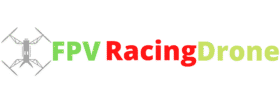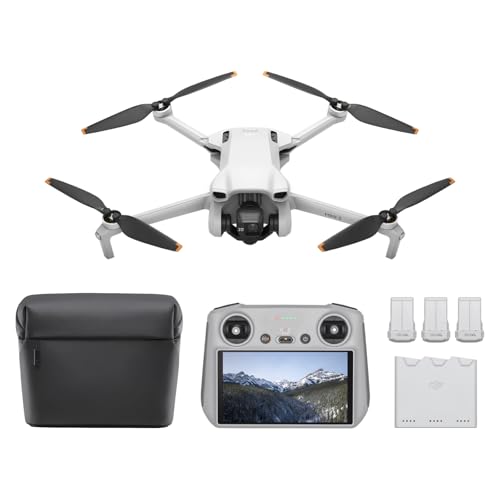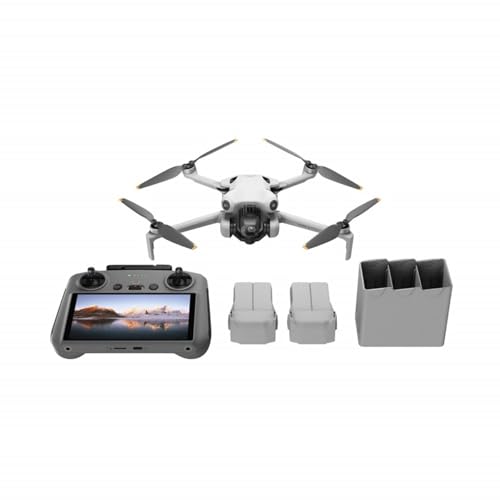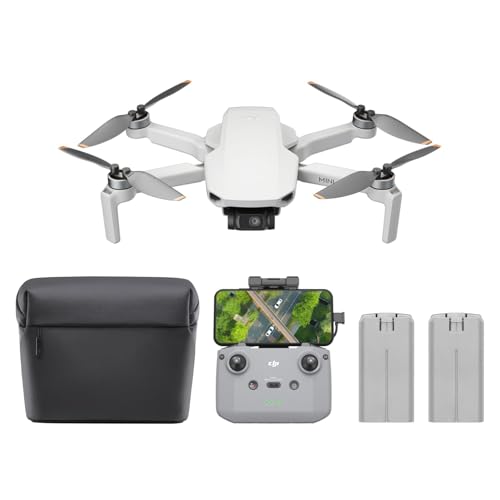Gone are the days of risky ladder climbs and tedious manual inspections. Drones have revolutionized the way we approach roof assessments, offering a safer, faster, and more detailed solution. And when it comes to reliability and cutting-edge technology, DJI often leads the pack. If you’re looking for the best DJI drone for roof inspections, you’ve come to the right place.
Whether you’re a seasoned professional or a homeowner wanting to keep an eye on your property, finding the right aerial inspection tool is key. A good drone allows you to capture high-resolution imagery, identify potential roof damage, and conduct thorough property assessments without ever leaving the ground. From compact, easy-to-fly models to professional-grade powerhouses, DJI offers a drone for every need.
We’ve scoured the market to bring you a comprehensive list of the top 10 DJI drones perfectly suited for tackling roof inspections. We’ll break down their features, pros, and cons to help you make an informed decision and find the ideal DJI drone for roof inspections that fits your budget and specific requirements. Let’s dive in!
Our Top Picks: The Best DJI Drones for Roof Inspections
1. DJI Mini 4K Camera Drone Combo

The DJI Mini 4K Camera Drone Combo is a fantastic entry point for anyone needing a compact and capable drone for roof inspections. What makes it stand out is its incredible portability and the fact that, at under 249g, it generally doesn’t require FAA registration for recreational use, making it super convenient. Don’t let its size fool you; it captures stunning 4K UHD video, perfect for scrutinizing shingles, gutters, and flashing from a safe distance.
-
Key Features:
- No FAA Registration Needed (under 249g for recreational use)
- 4K Ultra HD & 3-Axis Gimbal for stable, clear footage
- 38kph (Level 5) Wind Resistance
- 10km Max HD Video Transmission
- Beginner-Friendly with one-tap takeoff/landing, GPS Return to Home (RTH)
- Extended Battery Life (up to 93-min with 3-battery set)
- Intelligent QuickShots for automated cinematic moves
-
Pros:
- Extremely lightweight and portable
- Excellent 4K camera for detailed visual inspections
- Good wind resistance for its size
- Long transmission range for covering larger areas
- User-friendly for beginners
- Multiple battery options for extended flight time
-
Cons:
- Lacks advanced obstacle avoidance features of larger drones
- Limited additional sensors compared to pro models
- DJI Fly app download is off Google Play (requires direct download from DJI)
-
User Impressions: Users love how easy it is to get this drone flying and the surprisingly high quality of the 4K camera. Many appreciate the “no registration” aspect, making it ideal for quick, hassle-free roof assessments for homeowners or small businesses.
2. DJI Air 3S (RC-N3)

The DJI Air 3S steps up the game for serious property assessment with its enhanced camera and robust safety features. The star of the show is its 1-inch CMOS primary camera, delivering breathtaking 4K/60fps HDR video even in challenging low-light conditions, which is crucial when inspecting shaded areas or during sunrise/sunset. Its omnidirectional obstacle sensing provides immense peace of mind, allowing you to navigate complex roof structures with greater confidence.
-
Key Features:
- 1″ CMOS Primary Camera for enhanced detail in low light
- 4K/60fps HDR video with 14 stops of dynamic range
- Free Panorama Mode for stitching detailed panoramic shots
- Safer Nighttime Flying with Forward-facing LiDAR and omnidirectional obstacle sensing
- Next-Gen Smart Return-To-Home (RTH)
- Extended 45-min max flight time and 20km video transmission
-
Pros:
- Superior image quality and low-light performance
- Excellent obstacle avoidance for enhanced safety around structures
- Long flight time and transmission range suitable for larger roofs
- Smart RTH for reliable recovery
- Professional-grade video capabilities for detailed reporting
-
Cons:
- Heavier than Mini series, requires FAA registration
- Battery charger sold separately
- Higher price point
-
User Impressions: Reviewers highlight the Air 3S’s impressive camera and the reassurance of its obstacle avoidance. It’s often praised as a perfect balance between portability and professional capability for detailed aerial inspections.
3. DJI Avata 2 Fly More Combo (3 Batteries)

While not your typical roof inspection drone, the DJI Avata 2 offers a unique, immersive FPV flying experience that can be incredibly useful for extremely tight shots or getting a different perspective on specific roof details. Its built-in propeller guards make it robust and safer to fly in close proximity to structures, which is a big plus when you need to get up close and personal with a chimney or vent. The 4K/60fps footage with a super-wide 155° FOV gives you an “on-the-roof” feeling, making detailed visual analysis highly engaging.
-
Key Features:
- Adrenaline-Pumping Immersive Flying (FPV with goggles)
- Intuitive Motion Control for easy maneuvering
- Easy ACRO for performing advanced flight maneuvers
- Tight Shots in Super-Wide 4K (155° FOV, 1/1.3-inch sensor)
- Built-in Propeller Guard for enhanced safety
- Hassle-Free POV Content (LightCut app templates)
- DJI Avata 2 Fly More Combo includes 3 Intelligent Batteries, DJI RC Motion 3, DJI Goggles 3
-
Pros:
- Excellent for close-up, detailed inspections with FPV view
- Built-in propeller guards minimize damage risk near structures
- Super-wide FOV captures a lot of detail in tight spaces
- Highly durable design
- Motion control can make precise movements easier for some users
-
Cons:
- FPV flying has a learning curve and might not be suitable for all inspection types
- Not ideal for wide area scanning compared to traditional drones
- Activation via DJI Fly app (download from DJI website)
- FAA Remote ID Compliant (requires registration for commercial use)
-
User Impressions: FPV enthusiasts love the Avata 2 for its thrilling flight. For inspection tasks, users find its robustness and the ability to navigate tight spots with the prop guards invaluable, though they acknowledge it’s a niche tool for specific inspection scenarios.
4. DJI Mini 4K Fly More Combo

The DJI Mini 4K Fly More Combo builds on the strengths of the single-battery version by addressing one of the biggest concerns for any drone user: battery life. This package includes three batteries, a two-way charging hub, and a shoulder bag, ensuring you have enough juice to complete extensive roof inspections without interruptions. It retains all the excellent features of the Mini 4K, making it an even better value for consistent aerial inspection work. This truly is a formidable contender for the best DJI drone for roof inspections when portability and extended flight are key.
-
Key Features:
- No FAA Registration Needed (under 249g for recreational use)
- 4K Ultra HD & 3-Axis Gimbal for stable, clear footage
- 38kph (Level 5) Wind Resistance
- 10km Max HD Video Transmission
- Uninterrupted Creation with Extended Battery Life (3 batteries for up to 93 mins total flight)
- Beginner-Friendly and Safe features (RTH, stable hovering)
- Intelligent QuickShots for dynamic video capture
-
Pros:
- Exceptional total flight time (up to 93 minutes) with included batteries
- Portable and lightweight, easy to transport
- High-quality 4K camera for detailed imagery
- Strong wind resistance for stable flight
- Great for covering larger residential roofs or multiple smaller ones
- Value-packed combo for serious users
-
Cons:
- Still lacks advanced obstacle avoidance
- DJI Fly app download is off Google Play
- May still require registration for commercial use, despite weight
-
User Impressions: Customers rave about the convenience of the Fly More Combo, emphasizing that the extra batteries are a game-changer for getting real work done. They find it highly effective for detailed residential roof inspections.
5. DJI Mini 4K, Drone with 4K UHD Camera for Adults

This is the base model of the DJI Mini 4K, offering an affordable and accessible entry into drone-based roof inspections. While it comes with only one battery, it still delivers the core capabilities needed for effective aerial assessments: a crystal-clear 4K camera with a 3-axis gimbal for stable footage, impressive wind resistance, and user-friendly controls. It’s ideal for individual homeowners or those testing the waters of drone inspections without a huge initial investment.
-
Key Features:
- No FAA Registration Needed (under 249g for recreational use)
- 4K Ultra HD & 3-Axis Gimbal for cinematic quality shooting
- 38kph (Level 5) Wind Resistant
- 31-Min Max Flight Time (with 1 battery)
- Beginner-Friendly and Safe (one-tap takeoff/landing, GPS RTH)
- Intelligent QuickShots for inspiring videos
- Includes DJI Mini 4K, 1 battery, RC-N1C remote controller
-
Pros:
- Most affordable option in the Mini 4K series
- Excellent 4K image quality for its price point
- Highly portable and easy to use
- Good wind resistance
- Perfect for basic, quick roof checks
-
Cons:
- Single battery limits continuous flight time for larger roofs
- Lacks advanced obstacle avoidance
- DJI Fly app download requires manual installation
-
User Impressions: New drone pilots and budget-conscious buyers appreciate the Mini 4K’s simplicity and performance. They note it’s a solid drone for visual inspections and hobby flying, though many recommend purchasing extra batteries for more extensive use.
6. DJI Mini 3 Fly More Combo (DJI RC)

The DJI Mini 3 Fly More Combo with DJI RC is a step up from the Mini 4K, offering enhanced camera capabilities and a superior remote control experience. Its 4K HDR video with Dual Native ISO Fusion ensures stunning detail in both highlights and shadows, crucial for identifying subtle roof damage. The included DJI RC with its built-in display eliminates the need for your phone, streamlining your workflow. Plus, the Fly More Combo’s extended total flight time ensures you won’t run out of power mid-inspection.
-
Key Features:
- No FAA Registration Needed (under 249g for recreational use)
- 4K HDR Video with Dual Native ISO Fusion
- True Vertical Shooting for social media-ready content
- Extended Battery Life (up to 114 mins total with Fly More combo)
- 38kph (Level 5) Wind Resistant and 3-Axis Gimbal
- 10km Max HD Video Transmission
- DJI RC remote controller with built-in 5.5-inch HD display
- Beginner-Friendly with GPS RTH, Precise Hovering
-
Pros:
- Superior image quality with HDR and better low-light performance than Mini 4K
- Integrated screen on DJI RC improves usability and visibility
- Excellent total flight time for thorough inspections
- Good wind resistance and stable flight
- QuickTransfer via Wi-Fi for fast data offload
-
Cons:
- Intelligent Flight Battery Plus (for 51 min single flight) makes it over 249g
- Still lacks omnidirectional obstacle sensing
- Higher price than the Mini 4K series
-
User Impressions: Pilots love the DJI RC’s convenience and the Mini 3’s improved camera, noting that the HDR video makes a real difference for detailed inspections, even in varied lighting conditions. The long total flight time is a big bonus.
7. DJI Mini 3 (DJI RC)

The DJI Mini 3 with DJI RC offers a fantastic blend of high-quality imaging and user-friendly operation. It’s similar to the Fly More Combo but comes with a single battery, making it a more accessible option if you already have extra batteries or plan to buy them separately. The 4K HDR camera captures intricate details, and the True Vertical Shooting feature can be surprisingly useful for capturing gutters or side panels of a roof, making your inspection photos instantly shareable and professional. The DJI RC controller is a major advantage for its bright, dedicated screen, making outdoor flying a breeze.
-
Key Features:
- No FAA Registration Needed (under 249g for recreational use)
- 4K HDR Video with Dual Native ISO Fusion
- True Vertical Shooting for unique perspectives
- 38kph (Level 5) Wind Resistant and 3-Axis Gimbal
- 10km Max HD Video Transmission
- Includes DJI RC with built-in 5.5-inch HD display
- Beginner-Friendly features (GPS RTH, Precise Hovering)
-
Pros:
- Excellent 4K HDR camera for superior image quality
- Dedicated DJI RC controller enhances flight experience
- Lightweight and portable, easy to deploy
- Good wind resistance for stable shots
- Great for precise visual data capture
-
Cons:
- Single battery limits flight duration compared to combo packs
- Intelligent Flight Battery Plus increases weight above 249g
- Lacks advanced obstacle avoidance
-
User Impressions: Users commend the Mini 3’s camera performance and the DJI RC’s convenience. They find it a reliable tool for regular, detailed roof assessments, particularly appreciating the clear display for real-time viewing of potential issues.
8. DJI Flip (RC-N3)

The DJI Flip (RC-N3) is an interesting contender, especially for those prioritizing safety and close-quarters maneuverability. Its full-coverage propeller guards, made from lightweight carbon fiber, significantly reduce the risk of accidental damage when flying near complex roof edges, chimneys, or trees. Weighing under 249g, it shares the registration-free advantage of the Mini series. The 1/1.3-inch CMOS sensor and 4K/60fps HDR video ensure you’re still capturing stunning, detailed footage, making it a versatile and safe choice for various inspection environments.
-
Key Features:
- Full-coverage propeller guards for enhanced safety
- Under 249g, no FAA registration needed for recreational use
- Subject tracking (Your On-the-Go Director)
- 1/1.3-inch CMOS sensor for clear images
- Stunning 4K/60fps HDR Video
- 31-Min Max Flight Time
- Includes DJI Flip, DJI RC-N3 remote controller
-
Pros:
- Propeller guards offer superior protection during close inspections
- Lightweight and regulation-friendly
- High-quality 4K HDR camera for vivid detail
- Good flight time for its class
- Ideal for beginners concerned about collisions
-
Cons:
- Propeller guards can slightly reduce aerodynamic efficiency
- DJI Fly app download is off Google Play
- Might be slightly bulkier with guards for storage compared to other Minis
-
User Impressions: Users appreciate the added safety of the propeller guards, especially when flying indoors or in tight spaces outdoors, making it less intimidating for new pilots to navigate around intricate rooflines. The camera quality also gets high marks.
9. DJI Mavic 4 Pro Drone with DJI RC 2
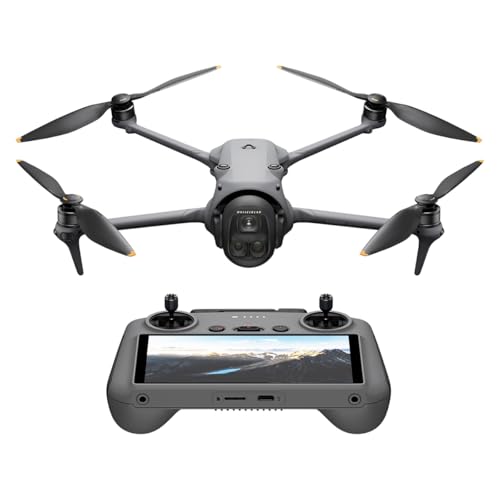
For professionals who demand the absolute best in image quality, flight performance, and advanced safety features, the DJI Mavic 4 Pro is the undisputed champion, and arguably the best DJI drone for roof inspections on a commercial scale. Its 100MP Hasselblad camera with 6K/60fps HDR video delivers unparalleled detail, while the dual tele cameras provide versatile zoom capabilities – essential for scrutinizing distant roof elements. Coupled with 0.1-Lux Nightscape Omnidirectional Obstacle Sensing and a 51-minute flight time, this drone is built for comprehensive, high-stakes inspections.
-
Key Features:
- 100MP Hasselblad Main Camera with 6K/60fps HDR video
- Dual Tele Cameras for versatile zoom and detailed shots
- 360° Infinity Gimbal for dynamic camera movement
- 0.1-Lux Nightscape Omnidirectional Obstacle Sensing for superior safety
- Extended 51 minutes of flight time
- 30km/18.6mi O4+ video transmission with 10-bit HDR
- 7″ rotatable, high-bright remote controller RC Pro 2
-
Pros:
- Unrivaled camera quality and resolution for maximum detail
- Exceptional obstacle avoidance, even in low light
- Longest flight time for extensive property coverage
- Professional-grade video transmission and dedicated remote controller
- Dual tele cameras are a huge advantage for remote zooming on damage
- Ideal for commercial roof inspection and property damage assessment
-
Cons:
- Premium price point
- Requires FAA registration due to weight and professional capabilities
- Larger and heavier, less portable than Mini series
-
User Impressions: Professionals consistently rate the Mavic 4 Pro as a game-changer for their work. The camera’s detail, the reliable obstacle avoidance, and the long flight duration make it an indispensable tool for complex commercial roof inspections.
10. DJI Mini 4 Pro Fly More Combo Plus with DJI RC 2

The DJI Mini 4 Pro Fly More Combo Plus is a groundbreaking option that combines the best of the Mini series with advanced Pro features. It maintains the sub-249g weight (with standard battery) for registration-free recreational use, but packs omnidirectional obstacle sensing – a huge leap in safety for a drone of its size. The 4K/60fps HDR vertical video is excellent for roof inspections, and the extended flight time with the “Plus” batteries (though they push it over 249g) ensures you can complete even the largest residential inspections. This drone offers an incredible balance of portability, advanced safety, and imaging prowess, making it a serious contender for the best DJI drone for roof inspections for a wide range of users.
-
Key Features:
- Under 249g (with standard battery) – No registration needed for recreational use
- Omnidirectional Obstacle Sensing for enhanced safety
- 4K/60fps HDR Vertical Videos
- Extended battery life (up to 45 mins per Plus battery in combo)
- 20km FHD Video Transmission
- Customizable Intelligent Tracking with ActiveShots 360°
- Includes RC 2, three 45 Mins Flight Time Batteries, Charging Hub, and Shoulder Bag
-
Pros:
- First Mini drone with omnidirectional obstacle sensing – a huge safety upgrade
- Retains sub-249g weight with standard battery for ease of use
- Excellent 4K HDR camera with vertical shooting
- Long flight time with included Plus batteries (though over 249g)
- Advanced tracking features for easier data capture
- Great balance of portability and professional features
-
Cons:
- “Plus” batteries push the weight over 249g, requiring FAA registration for recreational use
- Still not as robust in extreme winds as larger, heavier drones
- Higher price than other Mini models
-
User Impressions: Users are incredibly impressed by the Mini 4 Pro’s obstacle avoidance in such a small package. They find it offers a surprising level of professional capability for its size, making detailed and safe roof inspections much more accessible.
FAQ Section
Q1: Why should I use a drone for roof inspections instead of traditional methods?
A: Using a drone offers significant advantages. It’s safer, eliminating the need for dangerous ladder climbs. It’s faster, allowing you to cover large areas quickly. Drones provide high-resolution imagery and video, enabling detailed visual documentation of roof damage, blocked gutters, or structural issues, often from angles impossible to reach manually. It also reduces labor costs and provides clear records for insurance or repair purposes.
Q2: What are the most important features to look for in a DJI drone for roof inspections?
A: Look for a drone with a high-resolution camera (4K is a good minimum, 6K is even better) with a stable 3-axis gimbal for clear, shake-free images. Long flight time (30+ minutes) and good video transmission range are crucial for covering large roofs. Obstacle avoidance sensors are highly recommended for safety around chimneys, vents, and other roof structures. Good wind resistance ensures stable flight in varied conditions.
Q3: Do I need special training or a license to fly a drone for commercial roof inspections?
A: Yes, for any commercial use, including paid roof inspections, you generally need to obtain a Part 107 certificate (Remote Pilot Certificate) from the FAA in the United States. This involves passing an aeronautical knowledge test. For recreational use, rules are more relaxed, especially for drones under 249 grams, but always check local regulations.
Q4: How do obstacle avoidance features benefit roof inspections?
A: Obstacle avoidance sensors act as an extra layer of safety. They help the drone detect and steer clear of objects like antennas, chimneys, vents, trees, or power lines, significantly reducing the risk of collisions. This is especially valuable when navigating complex roof structures or flying in windy conditions, providing peace of mind and protecting your investment.
Q5: What camera resolution is best for detecting subtle roof damage like small cracks or missing shingles?
A: For detailed roof damage detection, 4K resolution is usually sufficient to identify most issues. However, if you’re looking for extremely subtle cracks or highly detailed granular assessments, a drone with 5K or 6K resolution (like the DJI Mavic 4 Pro) or one with a larger sensor (like the DJI Air 3S) will provide even more clarity and allow for greater digital zoom without significant pixelation.
Q6: Is battery life a major concern for professional roof inspections?
A: Absolutely. A short battery life can interrupt your workflow and make inspecting large or multiple roofs impractical. Look for drones with at least 30 minutes of flight time per battery. Investing in “Fly More Combos” with multiple batteries and a charging hub is highly recommended to ensure you have enough power to complete extensive inspection tasks efficiently.
Q7: Are the smaller DJI Mini drones suitable for professional roof inspections?
A: The DJI Mini series (Mini 3, Mini 4K, Mini 4 Pro) are surprisingly capable. For lighter professional tasks, like residential roof inspections, they can be excellent due to their portability and 4K cameras. The Mini 4 Pro, with its omnidirectional obstacle sensing, is particularly good. However, for large commercial properties or highly complex industrial inspections, larger drones like the DJI Air 3S or Mavic 4 Pro offer more advanced features, longer flight times, and superior cameras that might be necessary.
Conclusion
Choosing the best DJI drone for roof inspections really boils down to balancing your budget, the level of detail you need, and the complexity of the roofs you’ll be examining. From the budget-friendly and regulation-friendly DJI Mini 4K for quick homeowner checks to the powerhouse DJI Mavic 4 Pro designed for comprehensive commercial assessments, DJI offers an impressive range.
For most residential and light commercial inspections, the DJI Mini 4 Pro Fly More Combo Plus offers an exceptional blend of portability, advanced safety features, and high-quality imaging, making it a truly versatile choice. However, if uncompromised detail and extended reach are your top priorities, you can’t go wrong with the robust DJI Mavic 4 Pro or the capable DJI Air 3S.
Whichever you choose, embracing drone technology for roof inspections will undoubtedly make your work safer, more efficient, and incredibly detailed. Happy flying, and here’s to getting those perfect aerial views!
